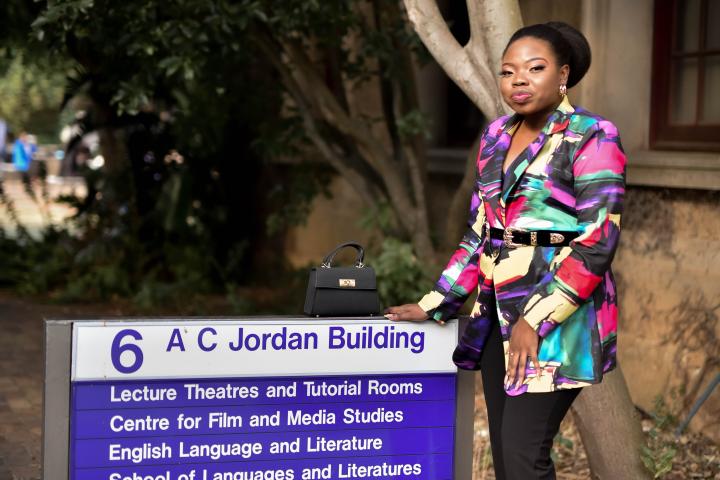Thelma Nyarhi: Weaving a Tapestry of Belonging in a World of Incompleteness

“The human will break,” says Thelma softly. “They reach a breaking point.”
For Heritage Month, we often turn to the artefacts of the past: songs, languages, and
stories that tell us who we were. But what if heritage is not a relic to be preserved, but a
living, breathing, and often painful dialogue between memory and the future? What if our
identity is not a finished portrait, but a mosaic—beautiful, powerful, and inherently
incomplete? On the heels of Women’s Month, identity and heritage are often seen as a
complete and unblemished narrative, but for many, particularly women in South Africa, it
is a story of incompleteness.
This is the world of Thelma Nyarhi — an author, a researcher, a passionate teacher,
an Anthropologist, and a PhD candidate at the University of Cape Town. She is not
just a thinker; she is a weaver, meticulously threading together the fractured
narratives of migration, womanhood, and Africanness into a profound
understanding of what it means to belong in a world determined to make you feel
like you don’t.
In a country often dubbed the “rape capital of the world,” where Womxn’s Day can feel
like a heavy, unresolved paradox rather than a celebration, Thelma’s work is a radical act
of listening. She does not celebrate the day, she explains, because “we are still fighting
for the same thing our foremothers fought for.” The haunting echo of that
sentiment—we are still fighting for the same thing our foremothers fought for—forms the
bedrock of her research. She asks not what we are remembering, but what we are
building. “The work needs to be done,” she states, her voice a blend of grace and
unwavering resolve. “If not for our current reality, then for the next generation.”
“We are still fighting for the same thing our foremothers fought for.”
The Researcher as a Healer: Finding Self in the Stories of Others
Thelma’s journey into anthropology was, ironically, born from a place of dislike. “I
remember, undergrad, oh my goodness, I hated anthropology,” she recalls with a laugh.
But it was within this discipline that she found a mirror for her own complex history. Her
research into feminised migration, citizenship, and belonging became a vessel for her
own healing—a way to understand the “multiple nationalities” she carries and the
“power structures” that define them.
Her own family narrative is a tapestry of movement, beginning with her grandfather
travelling from South Africa to Zimbabwe - for shelter and safety when his own country
[South Africa] turned its back on him-, a journey that shaped her understanding of
home, not as a pin on a map, but as a feeling of safety, a network of relations. “It’s all
about who’s around me. What’s making me feel safe, what’s making me feel like I
belong?” This personal quest for belonging fuels her academic rigour, allowing her to
research with people, not on them.
The Weight of Witnessing and the Violence of Translation
To read Thelma’s work is to understand the immense emotional labour of a researcher
who immerses herself in fields of trauma. She speaks of the “woundedness in the field,”
the “scars,” and the “violence” that is sometimes “done out of survival.” The greatest
challenge, she reveals, is not the research itself, but the aftermath: the “violent” act of
translation.
“How do you then translate what I'm feeling? Translate what I've seen, translate what
I've heard, and put it into words that can be digested?” This process is a brutal
confrontation with the stories she holds in her body. Her breakthrough comes from a
profound sense of duty: a reminder that she is a voice for those who shared their hopes
and fears with her. “Untold stories have never healed anything,” she asserts. Stories
must be told for change to happen.
On Fear, Hope, and the Pockets of Sisterhood
In discussing political climates like Operation Dudula, Thelma exhibits a breathtaking
depth of empathy that transcends easy judgment. She identifies the root not as pure
hatred, but as a politicised, socialised fear—a fear that “constantly reignited through
political rhetoric” and unresolved trauma. “The human will break,” she says softly. “They
reach a breaking point.”
Yet, within this bleakness, her research reveals powerful “pockets of belonging.” She
describes how the women she studies—often migrants navigating a hostile
society—create “sisterhoods” through WhatsApp groups. These digital spaces become
lifelines for venting frustrations, sharing warnings about unsafe spaces, and fostering
hope. They adapt, learn local languages, and alter their dresses, not to erase
themselves, but to survive—exercising a quiet, daily resistance. Their hope, Thelma
notes, is a fragile but resilient thing, “fuelled by the inter-relational relationships,” a
testament to the human spirit’s refusal to be extinguished.
An Audacious Legacy: Advice for Future Thought Provokers and Creators
Heritage, for Thelma Nyarhi, is this active, uncomfortable, and audacious process of
becoming. Her advice to young scholars, particularly women, is to embrace this.
“Be audacious,” she urges, challenging the age-old dictum for women to “be humble”
and “stay behind.” It is a call for “respectful audacity” that shakes things up and brings
issues to the surface. For institutions like UCT, she advocates for leaning into the
discomfort. “Discomfort is the way that things can be challenged,” she says.
Transformation is not a box to be ticked but a continuous, accountable, and often
uncomfortable conversation we must all have.
Thelma Nyarhi is more than an academic; she is a testament to the power of a single
voice to hold a universe of stories. She is a woman who looks at the incompleteness of
our identities and our nation and does not see a flaw, but a potential—a space where we
can only become whole through relation to each other. This Heritage Month, her work
reminds us that our greatest inheritance is not a static culture, but the ongoing,
courageous work of building a world where everyone can finally, truly belong.
Story: Khanyisile Mqwebedu
Photo: Supplied